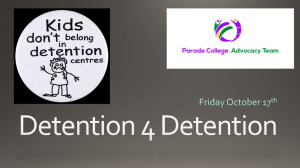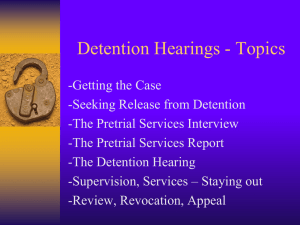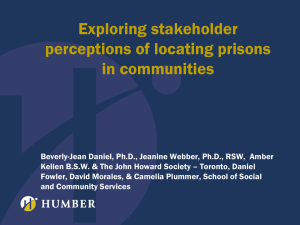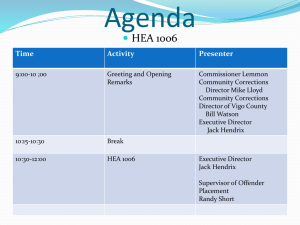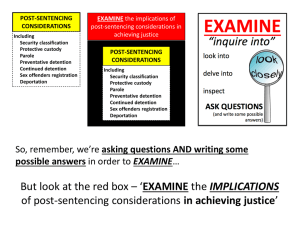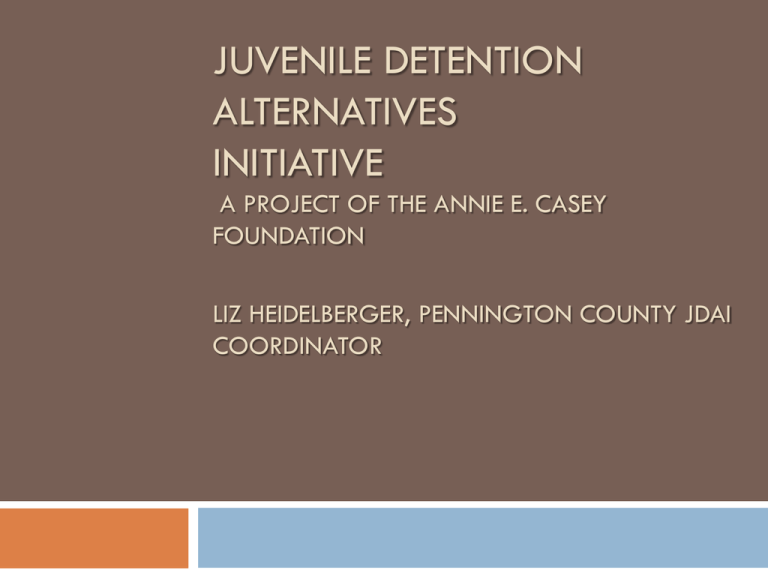
JUVENILE DETENTION
ALTERNATIVES
INITIATIVE
A PROJECT OF THE ANNIE E. CASEY
FOUNDATION
LIZ HEIDELBERGER, PENNINGTON COUNTY JDAI
COORDINATOR
JDAI IN SOUTH DAKOTA
Juvenile Detention Alternative Initiative (JDAI)
Anne E Casey Foundation
Juvenile Detention Reform
A project sought out by South Dakota Council of
Juvenile Services (CJS)
2 pilot sites: Minnehaha County & Pennington County
JUVENILE JUSTICE STRATEGY GROUP DASHBOARD
JDAI is now active in 140 jurisdictions in 32 states
ME
WA
MT
MN
OR
WY
CA
WI
SD
ID
NE
NV
KS
NY
IA
IL IN
OH
KY
MO
NJ
DE
MD
VA DC
NM
TX
MS
AL
LA
HI
Model site
PA
P
A
NC
TN
AZ
NH
MA
RI
County site
State site
JDAI sites reported significant reductions
in juvenile crime indicators
Juvenile
Crime
Indicator
# of Local
Sites
Reporting
Aggregate
Baseline
Aggregate
Recent
Change
(#)
Total Felony
Petitions
Filed
36 sites
(33%)
45278
34553
-10725
(-24%)
Juvenile
Arrests
12 sites
(11%)
38774
28761
-10013
(-26%)
Delinquency
Petitions
9 sites
(8%)
28504
17122
-11382
(-40%)
Juvenile
Intake Cases
15 sites
(14%)
34120
19525
-14595
(-43%)
GA
FL
Pending site
The average daily population in JDAI Sites has decreased, on average, by 42%
0%
-10%
-20%
-30%
-40%
-50%
-60%
-70%
-80%
-90%
-100%
JDAI VALUES
Serving the right youth in the right place at the
right time.
Serving youth in the least restrictive setting.
Protecting public safety.
Reducing racial, ethnic, and gender disparities
at all decision points in the Juvenile Justice
System.
Establishing programs to be efficient and
effective.
Using data to guide decision-making.
JDAI OBJECTIVES
Eliminate inappropriate or unnecessary use of
secure detention.
Minimize failures to appear and incidence of
delinquent behavior.
Redirect public finances to successful reform
strategies.
Improve conditions in secure detention facilities.
Reduce racial, ethnic, and gender disparities.
FUNCTIONS OF SECURE DETENTION
To prevent re-offending during
the time the youth is waiting for
his or her court appearance and
adjudication.
To ensure that a youth appears
for his or her court date.
RESEARCH SHOWS THAT MOST OF JUVENILES WHO ENGAGE IN
CRIMINAL BEHAVIOR DON’T CONTINUE INTO ADULTHOOD
% youth who self-report
criminal activity
100%
86
80
60
40
20
0
Arrested
during
adolescence
34
Self-report
criminal
activity, but
not arrested
52
Most youth
age out of
criminal
behavior on
their own
Longitudinal studies begun
in the 1950s show most
juvenile offenders age out
of criminal behavior
Researchers believe this is
because the transition to
young adulthood ‘cements’
bonds to society and
deters most from continued
criminality
PENNINGTON COUNTY JDAI COMMITTEES
AND WORK GROUPS
1.
JDAI Steering Committee
2.
Risk Assessment Instrument (RAI) Work Group
3.
Alternatives to Detention (ATD) Work Group
4.
Case Processing Work Group
5.
Disproportionate Minority Contact (DMC) Work
Group
6.
Facility Inspection
7.
Data and Evaluation
PENNINGTON COUNTY JDAI STEERING
COMMITTEE
Chief Steve Allender – Rapid City
Police Department
Jr Bettelyoun – Indian Education
Katie Bray – Rapid City Area Schools
Glenn Brenner – State’s Attorney’s
Office
Jim Mitzel – US Probation/Pretrial Services
Betty Oldenkamp – Lutheran Social Services
Paula Pederson – Public Defender’s Office
Alan Solano – Behavior Management
Systems
Sheriff Kevin Thom – Pennington County
Sheriff’s Office
Judge Jeff Davis – JDAI Co-Chair
Judge Wally Eklund
Judd Thompson – Court Services
Joe Guttierez –Juvenile Services Center
Judge Mary Thorstenson
Doug Herrmann – Department of
Corrections
Commissioner Don Holloway – JDAI
Co-Chair
Judge Janine Kern
Lloyd LaCroix – Community Member
LuAnn Van Hunnik – Department of Social
Services
Jay Van Hunnik – Wellspring, Inc.
Willie Whelchel – Pennington County
Sheriff’s Office
Paula Wilkinson-Smith – Lifeways, Inc.
PENNINGTON COUNTY JDAI ACTIONS TO
DATE
Pennington County JDAI Coordinator Hired
Model Site Visits
Completed May 2011; provided baseline data for the county to use in Data Driven Decisionmaking
Developing a data infrastructure for Quarterly Reports
Surveyed Local Services and Programs
Risk Assessment Instrument, Alternatives to Detention, Disproportionate Minority Contact, and
Case Processing work groups formed
Detention Utilization Study
Key stakeholders participated in a JDAI Model Site Visits in Albuquerque, NM and Portland, OR
Next visit scheduled in Portland, OR for September 2011
Work Group Formation
Liz Heidelberger, January 2011
Research completed regarding current community programs and services
Development of a Statewide RAI
Drafted the statewide RAI with Minnehaha County
Began the testing phase of the RAI on July 18, 2011
PENNINGTON COUNTY YOUTH POPULATION
(2009 DATA FROM THE OFFICE OF JUVENILE JUSTICE AND DELINQUENCY PREVENTION)
4.0%
13.3%
1.6%
7.9%
African American
Asian
Caucasian
Hispanic
Native American
73.2%
DETENTION UTILIZATION STUDY
(2010 SECURE DETENTION ADMISSION SAMPLE, 262 YOUTH IN THE SAMPLE)
Sex
Race
2%
33%
32.0%
African American
Female
Caucasian
Male
Hispanic
Native American
68.0%
65%
8%
DETENTION UTILIZATION STUDY
(2010 SECURE DETENTION ADMISSION SAMPLE, 262 YOUTH IN THE SAMPLE)
Primary Reason for Detention Referral/Admission
120
108
98
100
80
60
50
40
20
0
1
New Offense
Only
2
1
Violation of
Violated
New Offense and Detained Pending Sentenced to PostProbation,
Conditions of
Violation of
Post-Dispositional
Dispositonal
Violation of a Previous Release
Probation,
Placement
Placement
Valid Court
from Detention Violation of Valid
Order, and/or
Court Order, or
Failure to Appear
Other Violation
2
Other Reason
DETENTION UTILIZATION STUDY
(2010 SECURE DETENTION ADMISSION SAMPLE, 262 YOUTH IN THE SAMPLE)
Most Serious Current Offense Type
160
138
140
120
100
80
60
40
26
20
18
10
1
0
Violent Felony Drug Felony
5
Property
Felony
6
23
14
14
6
Other Felony Misdemeanor Misdemeanor Misdemeanor Misdemeanor
Other
Violation of
Assault
Weapon
Drug/Alcohol
Property
Misdemeanor Probation
1
Other
Violation
Status Offense
DETENTION UTILIZATION STUDY
(2010 REFERRED BUT NOT DETAINED AND NON-SECURE SAMPLE, 250 YOUTH SAMPLED)
Race
Sex
2%
46.0%
1%
44%
African American
Asian
Caucasian
Female
Hispanic
Male
Native American
53%
54.0%
2%
DETENTION UTILIZATION STUDY
(2010 REFERRED BUT NOT DETAINED AND NON-SECURE SAMPLE, 250 YOUTH SAMPLED)
120
Primary Reason for Detention Referral/Admission
113
100
77
80
60
46
40
20
2
0
New Offense Only
1
10
Violation of
Violated
New Offense and Detained Pending Sentenced to PostProbation,
Conditions of
Violation of
Post-Dispositional
Dispositonal
Violation of a
Previous Release
Probation,
Placement
Placement
Valid Court Order, from Detention Violation of Valid
and/or Failure to
Court Order, or
Appear
Other Violation
1
Other Reason
DETENTION UTILIZATION STUDY
(2010 REFERRED BUT NOT DETAINED AND NON-SECURE SAMPLE, 250 YOUTH SAMPLED)
Most Serious Current Offense
100
90
90
80
70
60
50
40
22
21
17
20
10
2
0
30
29
26
30
4
Violent Felony Drug Felony
4
Property
Felony
1
4
Other Felony Misdemeanor Misdemeanor misdemeanor Misdemeanor
Other
Violation of
Assault
Weapon Drug/Alcohol
Property Misdemeanor Probation
Other
Violation
Status Offense
PENNINGTON COUNTY JDAI NEXT STEPS
Finalize the Pennington County’s definition of the Use and Purpose of
Secure Detention
Completion of the Pilot Test RAI
Identify current gaps in service
Seek out and make recommendations for programs and/or services
that would fill in the gaps in service
Identify decision points in Case Processing in order to create a
seamless Case Processing procedure
Develop and build data infrastructure for data collection in order to
make data driven decisions
Task and organize the DMC work group
Implementation of the RAI and alternatives to detention programs
with a target date of January 1, 2012
Questions?
Additional information regarding JDAI is available
on the JDAI Help Desk at: www.jdaihelpdesk.org
Contact information for Liz Heidelberger,
Pennington County JDAI Coordinator:
E-mail:
liz.heidelberger@state.sd.us
Phone: 605-394-2571 or 605-593-6851

